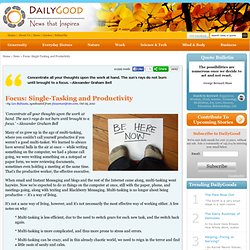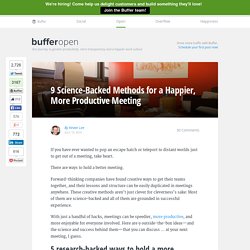

Focus, Filter, and Forget to Ease Out of Multitasking. How to Focus A Wandering Mind, by Wendy Hasenkamp. New research reveals what happens in a wandering mind—and sheds light on the cognitive and emotional benefits of increased focus.

We’ve all been there. You’re slouched in a meeting or a classroom, supposedly paying attention, but your mind has long since wandered off, churning out lists of all the things you need to do—or that you could be doing if only you weren’t stuck here… Suddenly you realize everyone is looking your way expectantly, waiting for an answer. But you’re staring blankly, grasping at straws to make a semi-coherent response. The curse of the wandering mind!
But don’t worry—you’re not alone. This suggests it might be good to find ways to reduce these mental distractions and improve our ability to focus. What happens in the wandering mind? For something that happens so often, what do we really know about this process of mind-wandering? For thousands of years, contemplative practices such as meditation have provided a means to look inward and investigate our mental processes. Train Your Brain for Monk-Like Focus. Focus: Single-Tasking and Productivity, by Leo Babauta. ‘Concentrate all your thoughts upon the work at hand.

The sun’s rays do not burn until brought to a focus.’ ~Alexander Graham Bell Many of us grew up in the age of multi-tasking, where you couldn’t call yourself productive if you weren’t a good multi-tasker. We learned to always have several balls in the air at once — while writing something on the computer, we had a phone call going, we were writing something on a notepad or paper form, we were reviewing documents, sometimes even holding a meeting at the same time. That’s the productive worker, the effective executive. When email and Instant Messaging and blogs and the rest of the Internet came along, multi-tasking went haywire. It’s not a sane way of living, however, and it’s not necessarily the most effective way of working either.
. * Multi-tasking is less efficient, due to the need to switch gears for each new task, and the switch back again. * Multi-tasking is more complicated, and thus more prone to stress and errors. 1. Monotasking. 8 Things Everybody Ought to Know About Concentrating. “Music helps me concentrate,” Mike said to me glancing briefly over his shoulder.

Mike was in his room writing a paper for his U.S. History class. On his desk next to his computer sat crunched Red Bulls, empty Gatorade bottles, some extra pocket change and scattered pieces of paper. In the pocket of his sweat pants rested a blaring iPod with a chord that dangled near the floor, almost touching against his Adidas sandals. On his computer sat even more stray objects than his surrounding environment. Mike made a shift about every thirty seconds between all of the above. Do you know a person like this? The Science Behind Concentration In the above account, Mike’s obviously stuck in a routine that many of us may have found ourselves in, yet in the moment we feel it’s almost an impossible routine to get out of. When we constantly multitask to get things done, we’re not multitasking, we’re rapidly shifting our attention.
Phase 1: Blood Rush Alert Phase 2: Find and Execute Phase 3: Disengagement. Focus on Doing a Few Tasks Well, Rather Than Filling Up Your To-Do List. 9 Science-Backed Methods for a Happier, More Productive Meeting. If you have ever wanted to pop an escape hatch or teleport to distant worlds just to get out of a meeting, take heart.

There are ways to hold a better meeting. Forward-thinking companies have found creative ways to get their teams together, and their lessons and structure can be easily duplicated in meetings anywhere. These creative methods aren’t just clever for cleverness’s sake: Most of them are science-backed and all of them are grounded in successful experience. With just a handful of hacks, meetings can be speedier, more productive, and more enjoyable for everyone involved.
Here are 9 outside-the-box ideas—and the science and success behind them—that you can discuss … at your next meeting, I guess. 5 research-backed ways to hold a more productive meeting 1. What’s your record for longest meeting? Can anyone beat my four-hour marathon? When it comes to meeting pain points, length often tops the list. Work expands to the time you schedule for it. 2. Set a 30 minute timer. 3.